
Aedos-Revista do Corpo Discente do Programa de Pos-Graduacao em Historia da UFRGS
Scope & Guideline
Fostering Critical Thought in Historical Research
Introduction
Aims and Scopes
- Interdisciplinary Historical Research:
The journal promotes interdisciplinary approaches to history, integrating insights from sociology, anthropology, and cultural studies to enrich historical narratives. - Focus on Marginalized Narratives:
A significant emphasis is placed on exploring the histories of marginalized groups, including black, indigenous, and immigrant communities, thereby contributing to a more inclusive historical discourse. - Critical Examination of Power Dynamics:
The journal often investigates the relationships of power, resistance, and identity, particularly in the context of Brazilian history, shedding light on the complexities of social hierarchies and struggles. - Engagement with Contemporary Issues:
It seeks to connect historical analysis with contemporary social issues, addressing themes such as racism, gender, and citizenship in current Brazilian society. - Pedagogical Approaches to History Education:
The journal also addresses methodologies and practices in history education, focusing on how historical narratives can be taught and understood in diverse educational settings.
Trending and Emerging
- Decolonial Perspectives:
There is a growing trend towards decolonial approaches in historical research, examining how colonial legacies continue to influence contemporary social structures and identities. - Intersectionality in History:
Emerging themes increasingly explore intersectionality, particularly how race, gender, and class interact in historical contexts, offering nuanced understandings of individual and collective experiences. - Community and Collective Memory:
A focus on collective memory and the role of communities in shaping historical narratives has become more pronounced, reflecting an interest in how groups remember and interpret their pasts. - Resistance and Social Movements:
Papers increasingly analyze social movements and resistance strategies of marginalized groups, emphasizing the importance of these narratives in understanding historical change and continuity. - Impact of Globalization on Local Histories:
The journal is also addressing the effects of globalization on local histories, exploring how transnational connections influence historical narratives and identities.
Declining or Waning
- Traditional Historical Narratives:
There is a noticeable decrease in the publication of papers focusing on conventional historical narratives that do not challenge or interrogate existing power structures, suggesting a shift towards more critical and inclusive approaches. - Eurocentric Perspectives:
The journal has moved away from Eurocentric interpretations of history, which were more common in earlier publications, favoring instead narratives that prioritize local and indigenous experiences. - Narrow Focus on Political History:
Research that centers solely on political history without considering the social implications and voices of marginalized communities has seen a reduction, indicating a broader trend towards interdisciplinary and socially engaged historical analysis.
Similar Journals
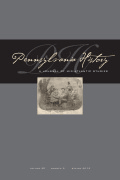
Pennsylvania History-A Journal of Mid-Atlantic Studies
Elevating Historical Discourse in Pennsylvania StudiesPennsylvania History: A Journal of Mid-Atlantic Studies is a prestigious academic journal published by Penn State University Press, dedicated to advancing the scholarship of historical studies in the Mid-Atlantic region of the United States. With an ISSN of 0031-4528 and an E-ISSN of 2153-2109, this journal has been a vital resource since its inception, providing critical insights into the cultural, social, and political landscapes of Pennsylvania and its neighboring states. Ranking in the Q2 category of the 2023 history quartiles, it plays an essential role in fostering dialogue among historians, researchers, and students alike, attempting to elevate the discussion surrounding Mid-Atlantic history. Notable for its consistent publication across multiple decades—specifically from 1971 and its converged years—it has established a legacy of scholarly excellence. While access options remain non-open, the journal curates comprehensive scholarly articles and contemporary research that collectively situate Pennsylvania within the broader narratives of American history. Engage with the robust academic contributions of Pennsylvania History to explore rich historical themes and narratives that shape our understanding of the Mid-Atlantic region.

Cuadernos de Historia Contemporanea
Unlocking Insights into Our Shared PastCuadernos de Historia Contemporanea is a prominent academic journal published by the UNIV COMPLUTENSE MADRID, SERVICIO PUBLICACIONES, dedicated to the field of contemporary history. Since its inception in 1988 as an Open Access publication, it has fostered a rich dialogue among historians, researchers, and students by providing a platform for the dissemination of high-quality scholarship across diverse topics in socio-political and cultural history. With an ISSN of 0214-400X and an E-ISSN of 1988-2734, this journal aims to enhance accessibility to research outputs and encourages scholarly contributions that advance understanding of contemporary historical processes. Located in Madrid, Spain, it plays a vital role in academic discourse within the European and global context, making it an essential resource for anyone seeking to deepen their knowledge in modern historical studies.

Contemporanea-Revista de Sociologia da UFSCar
Advancing sociological discourse for a global audience.Contemporanea-Revista de Sociologia da UFSCar is a leading academic journal published by the Department of Sociology at the Federal University of São Carlos, Brazil. With an ISSN of 2236-532X and an E-ISSN of 2316-1329, this journal has established itself as a significant platform for the dissemination of sociological research since it became Open Access in 2011. The journal aims to foster innovative discussions and provide scholarly insights that align with contemporary sociological trends, thus attracting a diverse readership comprising researchers, professionals, and students alike. By addressing crucial social issues and promoting interdisciplinary dialogue, Contemporanea plays a vital role in advancing sociological knowledge and inquiry in an increasingly complex world. Its commitment to accessibility ensures that valuable research findings are available to a global audience, enhancing the impact of sociological studies across borders.
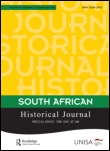
SOUTH AFRICAN HISTORICAL JOURNAL
Illuminating South Africa's Rich Historical TapestryThe SOUTH AFRICAN HISTORICAL JOURNAL, published by ROUTLEDGE JOURNALS, TAYLOR & FRANCIS LTD, serves as a vital platform for the dissemination of historical research focusing on South Africa and the broader African continent. Established in 1969, this esteemed journal has evolved to showcase high-quality scholarly articles and original research that contribute significantly to the field of history, achieving a commendable Q2 ranking within the History category as of 2023. With an impressive Scopus rank of #424 out of 1760, positioned in the 75th percentile of its category, the journal attracts contributions from a diverse array of historians and social scientists. Although not an open-access publication, it remains accessible to academia through institutional subscriptions, promoting critical discourse among researchers, students, and professionals. The SOUTH AFRICAN HISTORICAL JOURNAL is not only a repository of knowledge but also a catalyst for groundbreaking discussions and insights into the rich tapestry of South African history.
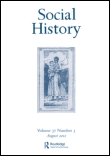
SOCIAL HISTORY
Exploring the Threads of Society Through TimeSOCIAL HISTORY, published by Routledge Journals, Taylor & Francis Ltd, is an esteemed journal dedicated to advancing the field of historical research, specifically focusing on the social dimensions of history. With an ISSN of 0307-1022 and an E-ISSN of 1470-1200, this journal has consistently contributed to the scholarly discourse since its inception in 1976. Positioned in the Q2 category for history in 2023, it ranks 240 out of 1760 in the Arts and Humanities, placing it in the top 14% of its field according to Scopus metrics. Although it is not an Open Access journal, its accessibility through institutional subscriptions ensures that a wide range of researchers, professionals, and students engage with its rich variety of articles that explore social history's diverse themes and methodologies. The journal aims to foster a deeper understanding of how historical events shape societies, offering valuable insights for those interested in the intricate interactions between past and present.

Erasmo-Revista de Historia Bajomedieval y Moderna
Navigating the Rich Tapestry of Historical ChangeErasmo-Revista de Historia Bajomedieval y Moderna is a prominent academic journal dedicated to the exploration of medieval and early modern history, published by UNIV VALLADOLID, SECRETARIADO PUBLICACIONES. With an E-ISSN of 2341-2380, this Open Access journal has been a valuable resource for researchers, professionals, and students since its inception in 2014, ensuring that scholarly work is freely accessible to a global audience. The journal aims to foster interdisciplinary dialogue and publish high-quality original research articles, reviews, and critical essays that contribute to the understanding of historical narratives and methodologies within its scope. Situated in the heart of Valladolid, Spain, Erasmo not only highlights significant historical events and figures but also encourages the examination of socio-political dynamics and cultural transformations from the medieval to the modern periods, making it an essential platform for scholarly discourse in the field of historical studies.
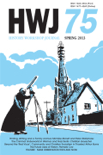
HISTORY WORKSHOP JOURNAL
Championing interdisciplinary connections in the humanities.Welcome to the History Workshop Journal, a premier academic publication housed under the esteemed Oxford University Press. With a rich history dating back to 1976 and converging through 2024, this journal is dedicated to enhancing discourse in the field of history, featuring cutting-edge research that offers fresh perspectives and innovative methodologies. Recognized for its exceptional quality, the journal is ranked in the Q1 category for History and Q2 for History and Philosophy of Science as of 2023, making it a vital resource for scholars aiming to explore interdisciplinary connections within the humanities. The Scopus rankings reinforce its significance, with a notable 88th percentile placement in History. By publishing rigorous peer-reviewed articles, the History Workshop Journal aims to foster scholarly engagement and critical dialogue, making it an indispensable tool for researchers, professionals, and students seeking profound insights into historical narratives and methodologies.
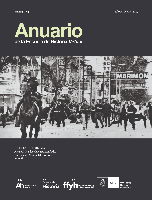
Anuario de la Escuela de Historia Virtual
Promoting Global Dialogue in Historical StudiesAnuario de la Escuela de Historia Virtual is a distinguished academic journal published by the Universidad Nacional de Córdoba, Facultad de Filosofía y Humanidades. With its focus on the field of history, this peer-reviewed journal aims to foster scholarly discussion and disseminate innovative research that contributes to the understanding of historical contexts and narratives. Since transitioning to an Open Access model in 2010, it has greatly increased accessibility for researchers, professionals, and students, thereby promoting a greater exchange of knowledge across linguistic and geographical boundaries. Published under the ISSN 1853-7049, the journal provides invaluable insights into historical analysis, methodologies, and interdisciplinary approaches, ensuring its relevance in contemporary academic discourse. Its commitment to high-quality, impactful research positions it as a vital resource within the historical scholarship landscape.
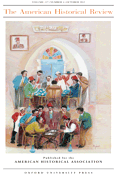
AMERICAN HISTORICAL REVIEW
Diving Deep into America's Rich Historical TapestryAMERICAN HISTORICAL REVIEW, published by Oxford University Press, stands as a premier journal in the field of history, representing a vital resource for researchers, academics, and students alike. With an impressive Q1 ranking in History and a robust track record in museology and archaeology, the journal is committed to advancing scholarly discussions and disseminating groundbreaking research that shapes our understanding of the past. While the journal is not open access, it remains highly respected, featured prominently in leading academic databases and boasting a significant impact on the humanities and social sciences. Its extensive coverage of historical periods—from 1970 through the present—ensures a comprehensive exploration of diverse historical narratives. The AMERICAN HISTORICAL REVIEW continues to foster intellectual engagement and diversity in historical discourse, making it essential reading for anyone keen on historical research and knowledge.

Revista de Historia da Sociedade e da Cultura
Connecting Historical Threads to Contemporary IssuesRevista de História da Sociedade e da Cultura is a distinguished open access journal published by UNIV COIMBRA, FAC LETRAS, dedicated to advancing the field of history. Established in 2014, this journal has become a valuable resource for researchers, professionals, and students, encouraging the critical study of social and cultural history from multiple perspectives. With an E-ISSN of 2183-8615, it remains accessible to a global audience, promoting scholarly communication and collaboration. The journal's commitment to open access since 2016 ensures that high-quality research is available to all without financial barriers. Currently ranked in the third quartile (Q3) in the category of History by Scopus, it holds an impressive position within the academic community, with a Scopus rank of #950 among 1760 journals within arts and humanities, reflecting its impact and relevance in the field. By exploring both historical methodologies and contemporary cultural issues, Revista de História da Sociedade e da Cultura aims to contribute meaningfully to scholarly discourse and foster a deeper understanding of historical contexts, making it a pivotal journal for anyone interested in the ever-evolving narratives of our past.